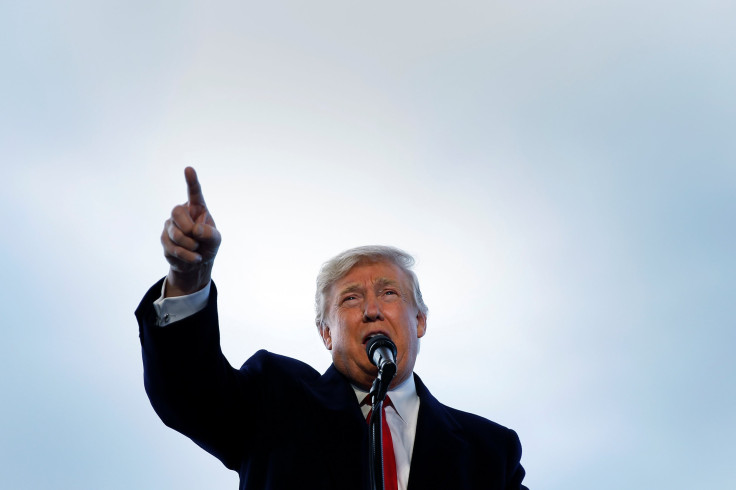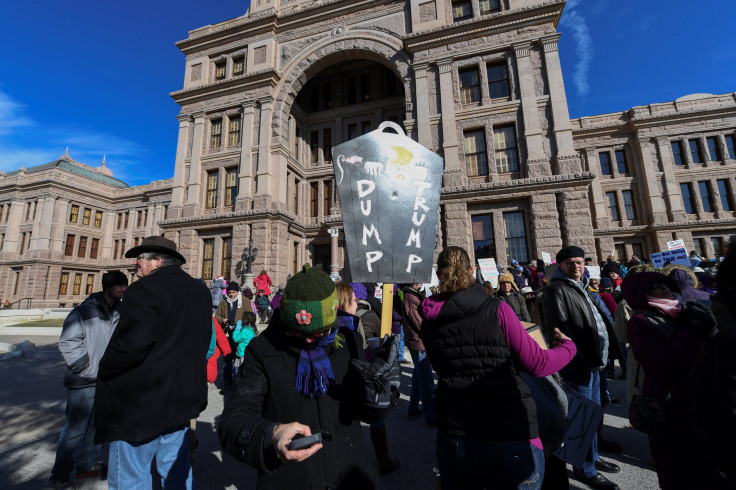Will Electoral College Vote Trump? Russia Hacks, Popular Vote, Faithless Electors Could Reverse Results

UPDATED: 5:50 p.m. EST — Donald Trump garnered the 270 electoral votes he needed to become the next U.S. president Monday, even as dozens of states had yet to post their results.
The Los Angeles Times said voting in Texas put Trump over the top, with 36 of the states electors casting their ballots for Trump, one for Ohio Gov. John Kasich and one for former Texas Rep. Ron Paul.
Congress will count the votes Jan. 6 and confirm the results.

Original story:
The Electoral College could reverse the results of the 2016 presidential election when it votes on Monday, handing a White House victory to Hillary Clinton. It would be one of the most unprecedented political incidents in American history, and nothing short of a future storyline made for "House of Cards."
There's only a moonshot chance of that happening, however. The former secretary of state would need at least 37 electors to change their votes from President-elect Donald Trump to her when the College casts their ballots for the next president of the United States on Monday afternoon. Any other event would ultimately result in Trump eventually assuming power come Inauguration Day, including whether a handful of "faithless electors" decide to switch their vote for another more formidable GOP candidate. However, as the U.S. intelligence community, including the C.I.A., now reports the Russian government definitively participated in cyberattacks to sway the presidential election in favor of Trump’s candidacy, electors and the majority of the public are calling for a delay in the College’s vote.

By Monday, more than 80 electors signed an open letter to the Director of National Intelligence James Clapper demanding the Electoral College receive a classified intelligence briefing on Russia’s involvement in the U.S. election ahead of its official vote. "Allegations that Donald Trump was receiving assistance from a hostile foreign power to win the election began months before Election Day," the letter read. "The Electors require to know from the intelligence community whether there are ongoing investigations into ties between Donald Trump, his campaign or associates, and Russian government interference in the election, the scope of those investigations, how far those investigations may have reached, and who was involved in those investigations."
The vote also came as Clinton was nearing a three-million popular vote lead against Trump, with 65,844,594 ballots to Trump’s 62,979,616, according to Cook Political Report. Trump secured the White House by edging out Clinton in three states by a total of 100,000 votes, effectively garnering him enough votes in the Electoral College to surpass the 270-vote threshold to secure the White House. The Clinton campaign eventually supported former Green Party Candidate Jill Stein's recount efforts in three states where a group of computer experts alleged electronic voting machines could have been compromised by foreign cyber attacks, as well as the call for an intelligence briefing for the Electoral College.
"The bipartisan electors' letter raises very grave issues involving our national security," Podesta said in a statement. "Each day that month, our campaign decried the interference of Russia in our campaign and its evident goal of hurting our campaign to aid Donald Trump. Despite our protestations, this matter did not receive the attention it deserved by the media in the campaign. We now know that the CIA has determined Russia's interference in our elections was for the purpose of electing Donald Trump. This should distress every American."
So far, only a handful of electors set to vote for Trump have announced their intentions for voting against Trump. Christopher Suprun, a Republican elector in Texas, was the first to announce he’d instead for another GOP candidate for president, citing the Federalist Papers in an Op-Ed for the New York Times.
Suprun wrote he and other electors share a duty to ensure "candidates are qualified, not engaged in demagogy, and independent from foreign influence … Mr Trump urged violence against protesters at his rallies during the campaign. He speaks of retribution against his critics."
Hey @realdonaldtrump We should tell Russia we don't want the President from the election they stole. Let them keep you. #Unpresidented
— Christopher Suprun 🇺🇲 (@TheChrisSuprun) December 18, 2016
"I owe no debt to a party," the elector continued. "I owe a debt to my children to leave them a nation they can trust."
Meanwhile, an exhaustive whip count operation led by the GOP has quietly been underway to ensure Republican electors would vote for the president-elect. If Trump falls short of the 270-vote threshold, but no other candidate receives over 270-votes as well, the decision is then made by the House of Representatives, which has a Republican-held majority.
In a year of never-ending plot twists to an almost surreal presidential election, the fate of this scene seems to be concrete. It seems the most likely scenario of all, by far, is President-elect Trump taking over the White House on Jan. 20.
© Copyright IBTimes 2024. All rights reserved.






















